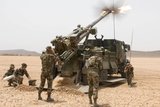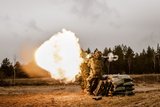Qatar and US launch expansion of Al-Udeid airbase
The US and Qatar launched a plan on 24 July to expand Al-Udeid airbase, the biggest military facility used by Washington in the Gulf as it battles jihadists, Qatari state media said.
The two countries also discussed making Al-Udeid a ‘permanent’ base, the official QNA news agency said, as Doha seeks to bolster ties with Washington at a time of tensions with its Gulf neighbours.
QNA said representatives from both countries on 24 July ‘laid the foundation stone for expanding’ Al-Udeid.
The project includes ‘the construction of barracks and service buildings to support joint security efforts, as well as improving the quality of life of the troops stationed at the airbase,’ it said.
Around 10,000 US troops are deployed in Al-Udeid, the largest US base in the Gulf where Washington stocks munitions and equipment and deploys warplanes used in the battle against the Islamic State (IS) group.
Other members of the US-led coalition fighting IS in Syria and Iraq are also deployed at Al-Udeid, located 35kms southwest of Doha.
QNA said the expansion project ‘underscores Qatar's commitment to deepening its strategic military relations with the United States.’
QNA said: ‘The State of Qatar, along with its strategic US ally, is working on drawing up a roadmap for the future of bilateral relations, including the addition of Al-Udeid Air Base to the list of US permanent military bases.’
Ryan Gliha, the US charge d'affaires in Doha, echoed this in remarks at a news conference after the ceremony to lay the foundation stone for the expansion of Al-Udeid.
‘We saw today the opening of a new construction project... what we hope to see in the coming years and months is (the) strengthening’ of bilateral ties, he said.
Using an Arabic acronym for IS, Gliha said: ‘Billions of dollars have been spent already at Al-Udeid over the last 15 years to support our operations... These are essential to the fight against Daesh and our ability to lead the coalition.’
Gliha described Qatar as an ‘indispensable partner for the United States.’
In April US President Donald Trump welcomed to the White House the Emir of Qatar, Tamim bin Hamad Al-Thani, for talks on improving bilateral ties that had been strained by Qatar's row with Gulf states.
The year-long crisis has seen regional kingpin Saudi Arabia and a number of its Arab allies impose a diplomatic and trade embargo on Qatar.
Trump had initially supported an economic blockade on Qatar, but aides – mindful of the pivotal role of Al-Udeid in US Middle East operations – convinced him to take a more moderate approach.
More from Defence Notes
-
![Venezuela prepares personnel and equipment for a potential second US attack]()
Venezuela prepares personnel and equipment for a potential second US attack
Defence Minister Gen Vladimir Padrino López has declared that the Venezuelan armed forces “will continue to employ all its available capabilities for military defence”.
-
![How might European countries look to tackle drone incursions?]()
How might European countries look to tackle drone incursions?
Disruption of infrastructure in Europe, whether by cyberattack, physical damage to pipelines or uncrewed aerial vehicles flying over major airports, as has happened more recently, is on the rise. What is the most effective way of countering the aerial aspect of this not-so-open warfare?
-
![Taiwan approved for $11 billion weapon purchase from US]()
Taiwan approved for $11 billion weapon purchase from US
The US State Department’s approval of a multi-billion-dollar sale of weapons to Taiwan includes tactical mission networks equipment, uncrewed aerial systems, artillery rocket systems and self-propelled howitzers as well as anti-tank guided missiles.
-
![Ireland spells out $2.3 billion shopping list in five-year defence spending plan]()
Ireland spells out $2.3 billion shopping list in five-year defence spending plan
Ireland’s multi-annual investment in capital defence spending is set to rise from €300m in 2026 to €360m in 2029–2030 with major upgrades across land, air, maritime and cyber domains.
-
![Canada to deepen integration of multi-domain capabilities to strengthen its defences]()
Canada to deepen integration of multi-domain capabilities to strengthen its defences
The Canadian Department of National Defence has created new organisations to manage the procurement and integration of all-domain solutions and allocated US$258.33 million to strengthen production capacities.
























